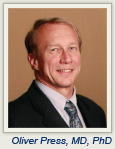The selected studies answer some critical questions in lymphoma that hematologists face daily and that have been the source of intense debate in the field, according to Oliver Press, MD, PhD, of the Fred Hutchinson Cancer Research Center and the University of Washington, Seattle.
“I think the studies give reassurance and guidance to the practicing oncologist, who can feel comfortable giving R-CHOP on a 3-week cycle, which is user friendly for the doctor and the patient,” he commented in an interview. “Second, it is very reasonable to defer transplant and only give it to patients who have disease recurrence—not to do it expectantly, but to wait until the patient demonstrates it’s necessary. And third, you don’t need to give maintenance rituximab to patients with large-cell lymphomas after transplant; it’s expensive treatment, and the expense isn’t warranted after transplant in that situation.”
Lingering Questions
At the same time, there are lingering questions. For example, is there a better rituximab-containing regimen for diffuse large B-cell lymphoma that gets away from CHOP? To that end, a phase III trial (Cancer and Leukemia Group B [CALGB] 50303) is pitting R-CHOP-21 against dose-adjusted EPOCH-R (etoposide, prednisone, vincristine, cyclophosphamide, doxorubicin, rituximab). The investigation has several embedded molecular studies, too.
“I think it’s a very important study and it could transform our treatment and improve the cure rate if EPOCH-R is superior—it may change entirely the way we treat large-cell–lymphoma patients,” Dr. Press contended. “So I would strongly encourage everyone to participate in that trial.” ■

 Three abstracts reported at the Best of ASCO® meeting in Seattle provide guidance to hematologists when it comes to long-standing gray areas in lymphoma management, according to Oliver Press, MD, PhD, of the Fred Hutchinson Cancer Research Center and the University of Washington, Seattle.
Three abstracts reported at the Best of ASCO® meeting in Seattle provide guidance to hematologists when it comes to long-standing gray areas in lymphoma management, according to Oliver Press, MD, PhD, of the Fred Hutchinson Cancer Research Center and the University of Washington, Seattle.